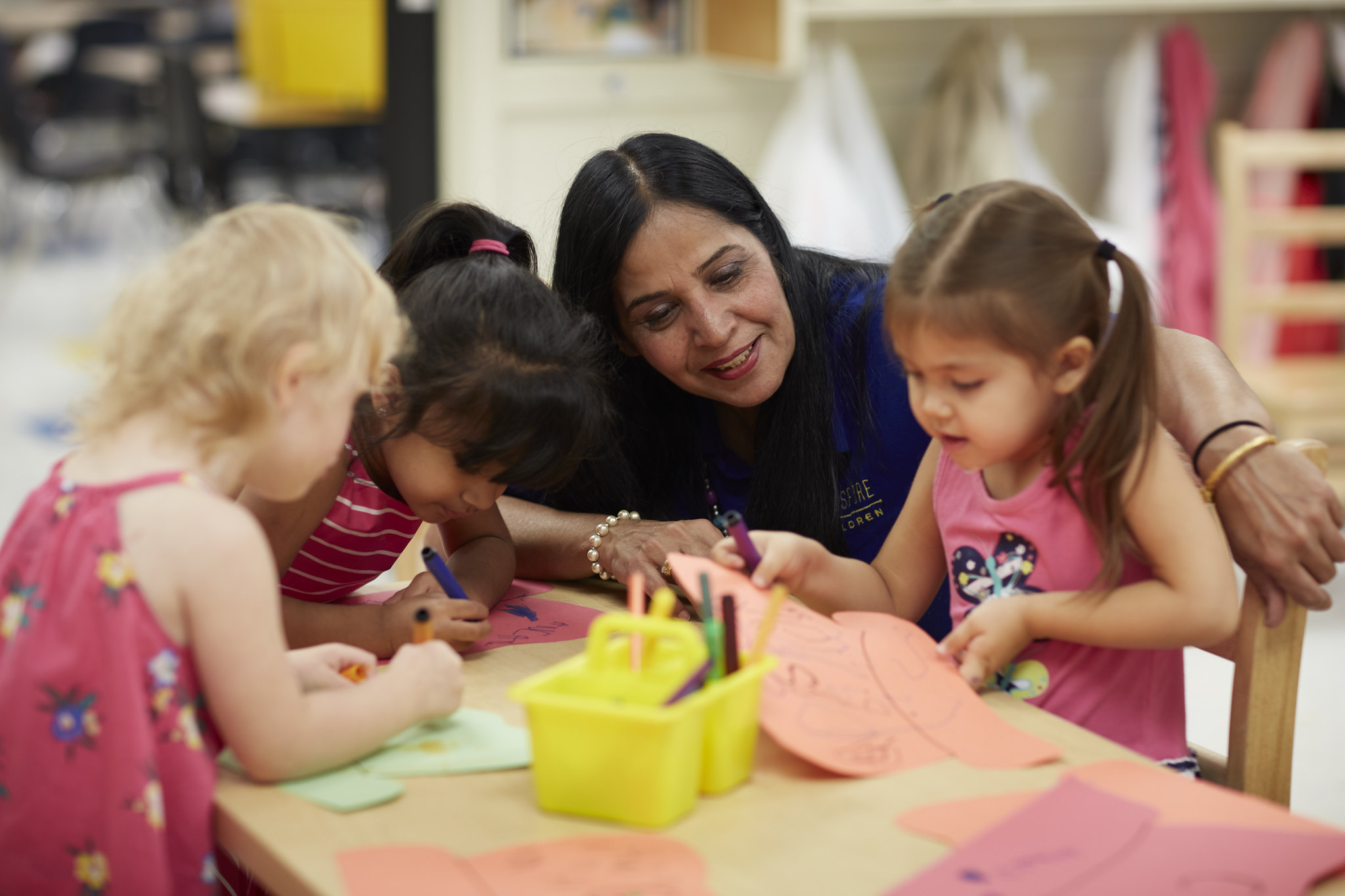Our partners at KinderCare know that trusting new caregivers is stressful, no matter the age of your child. There are so many options to choose from, and it can be challenging to find the child care center or caregiver that’s right for your family. That’s why KinderCare is offering a guide to help you in your search for the best child care option for you.
Tips From KinderCare Experts to Help Parents Choose A Caregiver:
Find a place where your child will be safe and loved.
- Caring for children is a huge responsibility. You want to find a caregiver who pays attention to every detail – big and small – and who makes themselves available to answer your questions whenever you have them.
- 61% of parents feel more confident themselves when they know their child is in a safe environment, according to a recent Harris Poll. While safety should always be a caregiver’s number one priority, you’ll also want to make sure teachers and caregivers are naturally talented at working with small children.
- Teachers who respond to children with kindness and compassion provide your child with an emotionally secure core, which is exactly what young children need to confidently go for – and reach! – the many milestones ahead.j
- Ask yourself (and the director or provider):
- Do they have a warm and loving demeanor with babies and children?
- What are the center’s safety procedures?
- Are the teachers or providers CPR-certified?
- What is their approach to naptime?
Will your child be seen and welcomed for who they are?
- Every child is unique and develops at their own pace and in their own way. Look for a center or caregiver who celebrates and encourages that individuality. According to a recent Harris Poll, 83% of parents say building a child’s confidence is crucial.
- Teachers and caregivers should get to know each child, and their family, and create opportunities for everyone to see reflections of themselves and their beliefs, customs, and cultures in the classroom community.
- How does the provider determine if children need a little extra support in certain areas? If your child does need additional help, will the center or caregiver be able to work with you to find the support your child needs? KinderCare uses a popular developmental screening tool to see if children are meeting developmental benchmarks for their age – and the test results show that KinderCare students are more prepared than their peers are for grade school.
- Ask yourself (and the director or provider):
- Do they have a regular way of communicating with families?
- Is there artwork on the walls that reflects the diversity of the children and their skills?
- How do they work with families to bring out the best in each child?
- What additional resources does the center or provider have access to? (KinderCare has their own Inclusion Services team devoted to advising and helping teachers meet each child’s unique needs and interests.)
How will the provider encourage your child’s natural sense of curiosity?
- Every second counts, especially because a young child’s brain is growing faster now than it ever will.
- Look for a classroom or learning space that’s set up with children in mind – with things at a child’s eye-level. Also keep an eye out for open-ended learning spaces where children and explore and decide how (and what) they want to do, learn, and create.
- Bonus points for a print-rich environment! Even if children can’t yet read, a classroom with books and words everywhere (even labels on chairs and tables) will help children develop literacy skills and build critical-thinking and self-reliance skills.
- It’s never too early to start learning, so ask questions about how teachers and caregivers encourage brain development in the youngest learners. For example, KinderCare’s curriculum helps babies build their brains with new sensory and language experiences.
- Ask yourself (and the director or provider):
- Do they have a formal curriculum?
- How do they help children develop reading and math skills in these important early years?
- Is there a lot of time for open-ended play? Are children in charge of their own play?
Socializing is the key to building important relationships.
- Think back to a time when you loved going to school. Odds are it’s because your favorite teacher made you look forward to learning something new.
- Look for a place where teachers are trained to listen to a child’s needs (at different ages and stages) and respond with appropriate suggestions and questions that guide children toward choice that will leave them feeling confident.
- Of course, friendships among children are also important for a child’s independence, self-confidence, and self-esteem. Social-emotional skills should be central to the curriculum so children know how to share a special toy with a friend, collaborate on a finger-painting project, and understand the importance of kindness.
- Ask yourself (and the director or provider):
- Are teachers focused on what the children are doing?
- Are they engaging with children by asking questions and speaking respectfully?
- How do they handle tears, or children working to share a toy?
For 50 years, KinderCare teachers have been creating safe, encouraging environments where kids can learn, grow and build confidence for life. At KinderCare, hardworking families are family, regardless of needs, backgrounds, and experiences.
KinderCare Learning Centers is opening a brand new center in New Hudson this September! Visit the New Hudson KinderCare on 30786 Lyon Center Drive East or contact 833-90-LEARN to schedule a tour and meet the Center Director.
Learn more about what to look for in a childcare provider at KinderCare.com.











